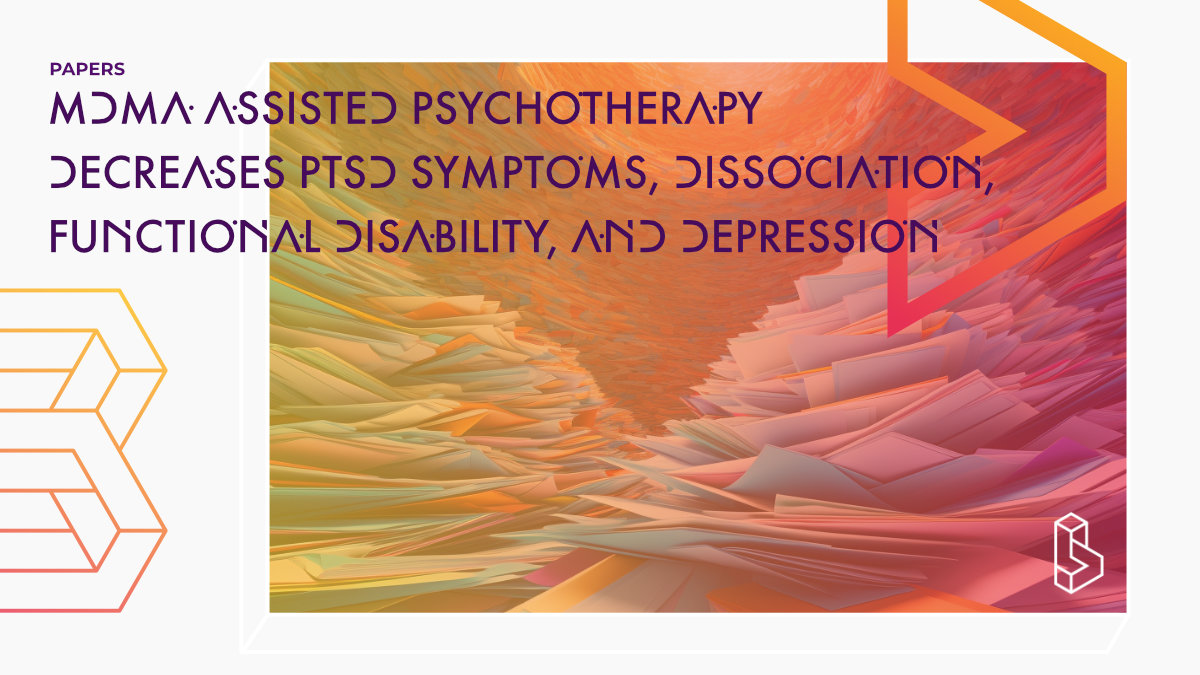This pre-print review and meta-analysis (2023) of randomized controlled trials (RCTs) assessed the effectiveness of MDMA-assisted psychotherapy (MDMA-AP/AT) for treating Post-Traumatic Stress Disorder (PTSD) and its impact on quality of life and physiological effects. The analysis found that MDMA-AP significantly improved dissociation, depression, and functional impairment in PTSD patients compared to controls, but not sleep quality.
Abstract of MDMA-Assisted Psychotherapy Systematic Review and Meta-Analysis
“Post-Traumatic Stress Disorder (PTSD) causes broad impairments affecting quality of life. However, despite current treatment many people with PTSD do not fully recover. MDMA assisted psychotherapy has emerged as a new therapy for PTSD and its comorbidities. We aimed to analyse the current evidence for MDMA assisted psychotherapy in PTSD and associated quality of life, and physiological effects, by conducting a systematic review and metanalysis of randomised controlled trials. ClinicalTrials.gov, MEDLINE, PsycINFO, PsycARTICLES, and Cochrane Library database were searched from inception to July 2022. We included both published and unpublished randomized control trials comparing MDMA assisted psychotherapy (MDMA-AP) with control. Meta-analysis of primary and secondary outcome measures was performed using Review-Manager software. Effect sizes were calculated using Standardised Mean Difference for CAPS scores and Mean Difference for secondary measures. MDMA-AP significantly improves dissociation, depression, and functional impairment, compared to controls, but not sleep quality. This data supports the use of MDMA-AP for PTSD with an improvement found in PTSD core symptoms and quality of life measures. While these findings are limited by small samples sizes in currently available clinical trials, this study provides empirical evidence to support development of MDMA-AP in PTSD.”
Authors: W. M. Green, S.B. Raut, F.L.J. James, D.M. Benedek, R.J. Ursano & L.R. Johnson
Summary of MDMA-Assisted Psychotherapy Systematic Review and Meta-Analysis
Post-traumatic stress disorder (PTSD) is a devastating condition that develops in some individuals who fail to recover from exposure to extreme threat situations, including actual or threatened death, serious injury, or sexual violence. Many patients do not recover from PTSD despite its prevalence. Current treatment options include cognitive process therapy and exposure therapy, but these do not provide complete recovery in all patients.
Psychedelics have been experimented with to assist in psychotherapy since the 1970s, and are currently ongoing a resurgence in interest for therapeutic use. MDMA was first synthesized in 1912 and is used as an illicit it recreational drug commonly referred to as ‘ecstasy’. MAPS have developed their own manualized MDMA-AP psychotherapeutic approach. The key element of MDMA therapy is its non-directive approach, which reduces barriers to treating traumatic memories. The treatment effect is long-lasting, and it is effective in participants who are non-responsive to SSRI treatments. The authors hypothesize that MDMA-AP treatment can improve symptoms of PSTD, sleep quality, and functional disability, as well as comorbid depression.
Find this paper
https://doi.org/10.1101/2023.08.17.23293955
Open Access | Google Scholar | Backup | 🕊
Cite this paper (APA)
Green, Warwick M., Sanket B. Raut, Fionnghuala LJ James, David M. Benedek, Robert J. Ursano, and Luke R. Johnson. "MDMA Assisted Psychotherapy Decreases PTSD Symptoms, Dissociation, Functional Disability, and Depression: A Systematic Review and Meta-Analysis." medRxiv (2023): 2023-08.

